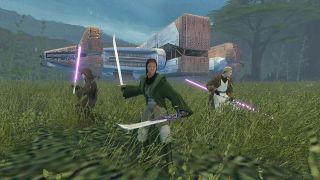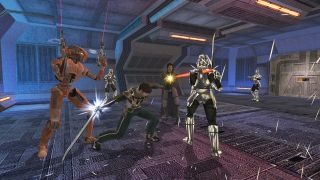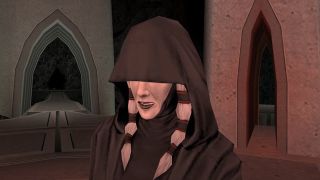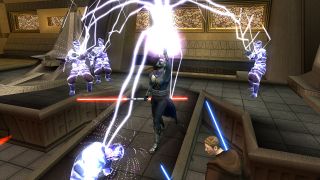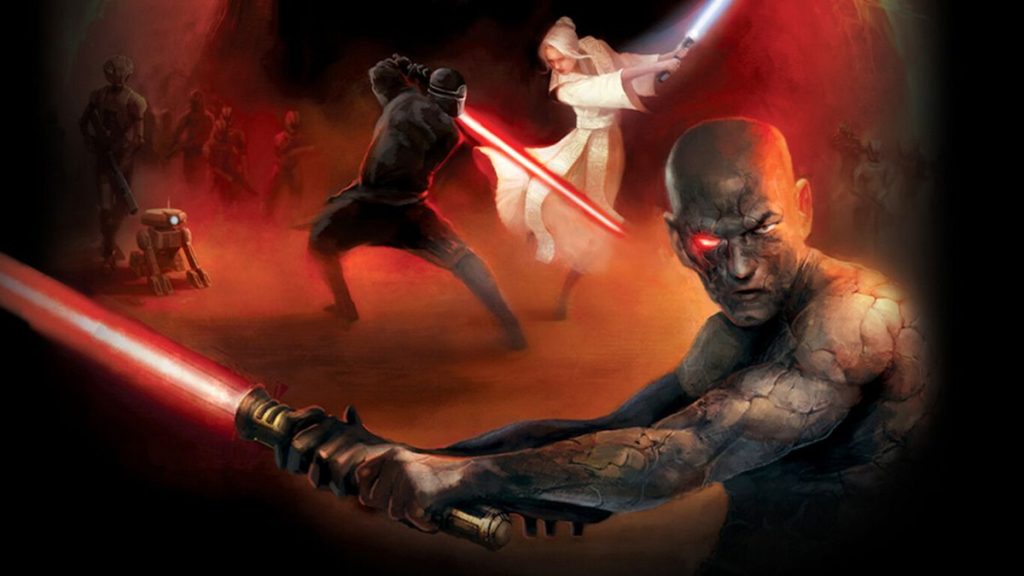
‘Knights of the Old Republic II’ at 20: The key to Star Wars’ future is found in its past (Image Credit: Space.com)
Knights of the Old Republic II (KOTOR 2), one of the best Star Wars games of all time, turns 20 this year and, against all expectations, remains profoundly relevant. What could both Star Wars as a whole and RPG video games learn from Obsidian Entertainment and LucasArts’ classic?
The Old Republic era, which (inexplicably) hasn’t been explored in live-action yet, continues to be one of the Star Wars fandom’s favorite bits of galactic history, mainly due to the all-out wars that – at least in the Legends continuity – broke out between the Jedi Order and the Sith Empire. KOTOR 2, however, chose to put the Jedi Knights on the back foot again because that’s how you create an engaging conflict from the get-go. It starts with a five-year jump that sees the Order almost completely wiped out by the Sith and the player embodying The Exile, a Jedi that, you guessed it, was exiled from the Order.
Before getting into spoilers, how the game was developed (come hell or high water), and its long-lasting legacy, let’s just say KOTOR 2 is the main reason why some diehard Star Wars fans won’t stop beating the ‘Gray Jedi‘ drum after all these years even if the on-screen canon has never veered in that specific direction. This justifies a closer (albeit quick) look at the quality of the writing in game and how Chris Avellone and his teams decided to shake things up in a way that modern Star Wars ought to consider.
If you’re eager to learn more about all things Star Wars, then we have some great news for you! We’ve got ranked lists of the best Star Wars movies and best Star Wars TV shows for you to check out. And we’ve even collected information on upcoming Star Wars games too, including we we know about the long-awaited KOTOR remake so far.
Spoilers ahead for Star Wars Knights of the Old Republic II: The Sith Lords
The right kind of evolution
At least when it comes to the moment-to-moment gameplay and RPG systems, Knights of the Old Republic II actually isn’t very different from its 2003 predecessor. Much like what happened with Fallout: New Vegas in 2010 (hastily cobbled together by Obsidian after Bethesda Game Studios’ Fallout 3 became a hit in 2008), BioWare and LucasArts passed the torch to Obsidian, whose key members had already worked with Black Isle Studios and BioWare on games like Planescape: Torment and Baldur’s Gate.
As a direct result (and due to the tight deadline on the project), KOTOR 2 retained most of what worked in the BioWare-developed original: pausable real-time combat based on orders to each party member, branching dialogues, semi-open locations, a bunch of lore-friendly minigames, and a light/dark side system based on the player’s choices. The one big difference between the two entries is the narrative, which is far more nuanced and mature in the Avellone-designed and written sequel.
The full title, Knights of the Old Republic II: The Sith Lords, suggested a bigger focus on the Sith. While that was true, mainly through the near-total defeat of the Jedi, it also explored the space between them and potential overlaps in their philosophies and core tenets. In the past the Star Wars movies (and recent shows like The Acolyte) have toyed with those ideas, but the good-evil dichotomy has firmly remained at the center of the on-screen Force-related narratives. This also applies to video games, which is why KOTOR 2’s more daring approach to the matter continues to feel refreshing 20 years on.
Avellone and his people recognized “a core part of what made KOTOR I so great” was the companions themselves and how they evolved alongside the player and their decisions. This was expanded upon in the sequel, and the enigmatic Kreia was at the center of those plans. After being set up early on as The Exile’s mentor, she begins to reveal her rejection of both the light and dark side of the Force, instead favoring the true power of freedom over the concept of predestination and being either good or bad.
A villain unlike the rest
Eventually, Kreia is revealed to be the Sith Lord Darth Traya, who essentially wants to destroy the Force. Avellone admitted a few years later she was meant to reflect his own “frustration” with the very “nature of the Force,” which he described as “some arbitrary force” that corrected the galactic history based on a mysterious design. No matter how well or not that story element clicked together with what George Lucas had done on the big screen up to Episode III (2005), it was a bold swing on its own. This also meant that Darth Nihilus‘ life-force-eating ambitions were no longer the craziest thing in the game.
Twenty years later, it seems that the larger Star Wars franchise is not entirely sure about what it wants to be anymore. However, it is acknowledging the ‘gray’ area first explored by KOTOR 2 (and even some comic books). Such ideas deserve further discussion by Lucasfilm, especially as the company begins to chart a path forward and away from the eternal Jedi-Sith conflict (at least in the post-IX stories).
Kreia’s/Traya’s motivations and in-game behavior reflect a deeper question about the nature of RPGs: Should players be guided along rigidly defined paths, or can there be another way, a more nuanced approach free from simple moral dualities?
In a twisted sort of way, Kreia is like a mother figure to the player’s blank-slate character, and that relationship and ‘guiding hand’ bridged the gap between KOTOR 2’s narrative and game design in a distinct manner that we’ve rarely seen again. “She mostly just wants you to grow as an individual. And she just wants you to realize the potential she sees in you,” Avellone said during a 2005 interview.
With The Clone Wars and other shows daring to explore the nature of the Force and what exists beyond what the gifted individuals can perceive and brandish (and this is what Lucasfilm’s creative honcho Dave Filoni excels at), is there a possible future where those deeper philosophical conversations are brought to the forefront of the franchise? Given the vitriolic reactions to the sensible questions posed by Rian Johnson in The Last Jedi (a movie that embraced the Jedi as necessary and good), we wouldn’t count on it, but we hope that we’re wrong.
The lessons learned (or not)
Knights of the Old Republic II’s legacy is complicated. On the one hand, it was a perfect example of how not to approach a sequel to a hit video game for money-hungry publishers; it launched in a poor state despite its many strengths, and only patches and years of community work made it a fully functional product.
On the other hand, KOTOR 2 remains the prime example of what Star Wars can be if it minimizes its connections to the Skywalker Saga and rigid philosophies of the Jedi and Sith without removing them from the equation altogether. Different, long-distant era aside, it’s the sort of project that’s inspired fans (and even some creatives) to explore the weirder, less predictable side of the Star Wars galaxy. The big question is: does Lucasfilm feel confident enough to shake things up and break free from the self-imposed limitations of decades of clear-cut Jedi vs. Sith and Empire vs. Rebels conflicts?
If the post-2019 stretch of on-screen Star Wars stories has taught us anything, it’s that it can adopt many forms, expand the tonal canvas, and explore new horizons (with only a rabid fanbase in the way of progress). That same community praises KOTOR 2 time and again, but I suspect it may be for surface-level reasons, as it preached the exact opposite of what the average Star Wars diehard wants. Personally, I’m with Kreia on this one: it might be time to break with tradition.
Star Wars Knights of the Old Republic II: The Sith Lords is currently available to purchase on PC, Xbox, Nintendo Switch, Android, and iOS.


